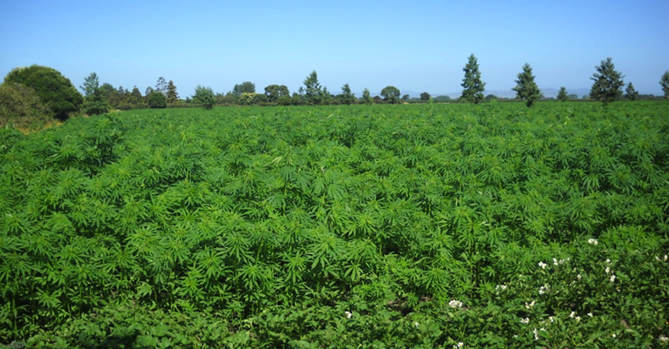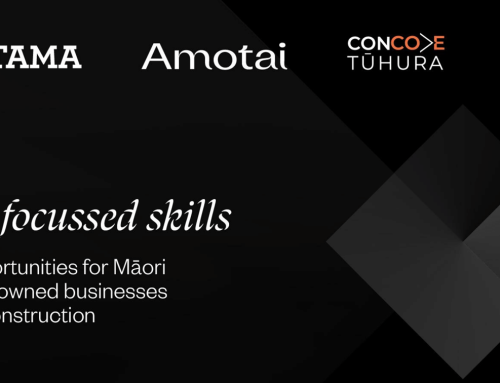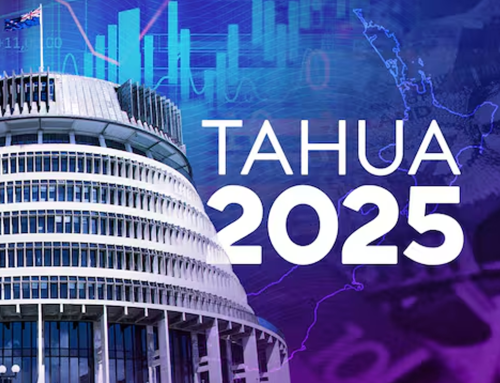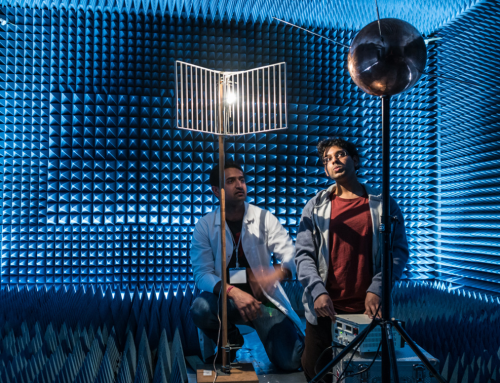Poutama is embarking on its largest collaborative effort ever, pulling together 26 Māori and non-Māori businesses as well as two Canadian First Nations businesses under the umbrella of MIHI (Movers In Hemp Innovation). MIHI could even get larger with more businesses expressing interest in joining along with further First Nation and Native American involvement. And yet, MIHI does not have any formal structure and is basically still a loose grouping of like-minded people that are enthusiastic on what can be achieved through collaborating around the opportunities within hemp and CBD.
The art of collaboration, and it is an art, was no better demonstrated than at the third MIHI hui held early May at Agrisea HQ, Paeroa.
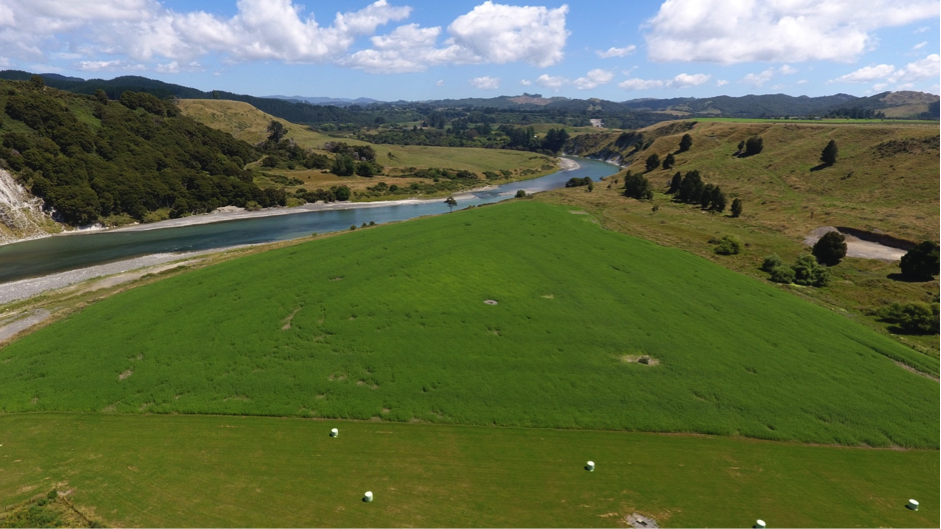
Mohaka hemp trial
We thought that the inaugural hui held at Hastings July 2018 was pretty special from whence the name MIHI emerged. And that the second MIHI hui, again held in Hastings February 2019, with site visits to hemp growers at Mohaka, Otane and Tāmaki nui a Rua was enlightening. But the third MIHI hui rose to another level with pathways on hemp growing and production, R&D, new product development and market insights starting to shine through.
At the third MIHI hui a high standard was set where the whānau at Agrisea really laid it on for everyone from opening mihimihi and karakia to succulent tasting kai, a well laid out venue, a room for after hui entertainment and of course a real coffee making machine. Huge appreciation to Tane, Clare and whānau. It was really like being at the marae with generous doses of manaakitanga, aroha, katakata and of course the foundation of collaboration, whanaungatanga.
For day one of the hui there was a focus on the trials and tribulations of producing hemp. Kōrero was given by MIHI’s most experienced hemp producer Kanapu Hemp Foods on how they’ve progressed their business over the past five years. They are now at the point where they are raising capital to help with rolling out a range of hemp based products including hemp milk. Hikurangi Enterprises through the marvels of communication technology beamed in from Gisborne to give an update on how their business is tracking. Hikurangi have struck out with vision and boldness underpinned by an unwavering desire to foster wellbeing among the people of Ruatoria and its environs.
The hui was then regaled with stories from Paroa Station and Tū Mai Rā Investments over their trial growing of 5ha plots of hemp. Key learning, the birds love hemp seeds and if you are not on to it and don’t move fast they can easily decimate your crop. Another learning, it’s good to have hawks around your hemp crop as they are an effective form of bird control. For future crops we’re now considering deploying drones that look like birds of prey. Birds feeding on hemp crops are a significant risk that cannot be ignored. Other learnings included, you’ve got to let the locals know that you’re growing hemp so as to avoid conflict with marijuana growers whereby crop cross-fertilisation can occur. Have a plan B when it comes to using contractors. Tū Mai Rā lost their entire crop due to the harvesting contractor not turning up.
Following on from this there was a fascinating talk given by a local organic dairy farmer who decided to grow hemp using organic practices. The result was a high yielding crop that was nurtured using organic growing methods. There was lots of discovery such as the crop fertilising itself and becoming a breeding ground for egrets. The crop grew to a height of 3m and produced an abundance of seeds. The hardest part was having to hand-harvest but this also resulted in a high return of seeds and fibre. Growing hemp using organic methods is what can help give MIHI growers a point of difference and is definitely worthy of consideration.
Further insights on the hemp experience were given by The Sustainable Hemp Coop, a grouping of Waikato farmers who have come together to pool resources and experiences. They see being part of MIHI as being able to contribute to the growing pool of talent, experience and resources within the group. There was also a presentation by MIHI founding member PĀMU on their hemp growing activities in the Wairarapa and Taupo areas.
Day one of the hui concluded with a summary of the MIHI hemp industry insights report prepared by Matiu Taurau from GHA. Part funding of this report was through the MBIE He Tupu Ōhanga scheme.
The day ended with what is becoming a tradition, the MIHI Po Whakangahau. The time for story-telling, enjoyment and entertainment all woven together for the purpose of amusement and unity, and a time for people to relax and to reflect on the relationship among them. This was exemplified through an evening spent at the Falls Retreat restaurant where singing accompanied by guitars came to the fore.
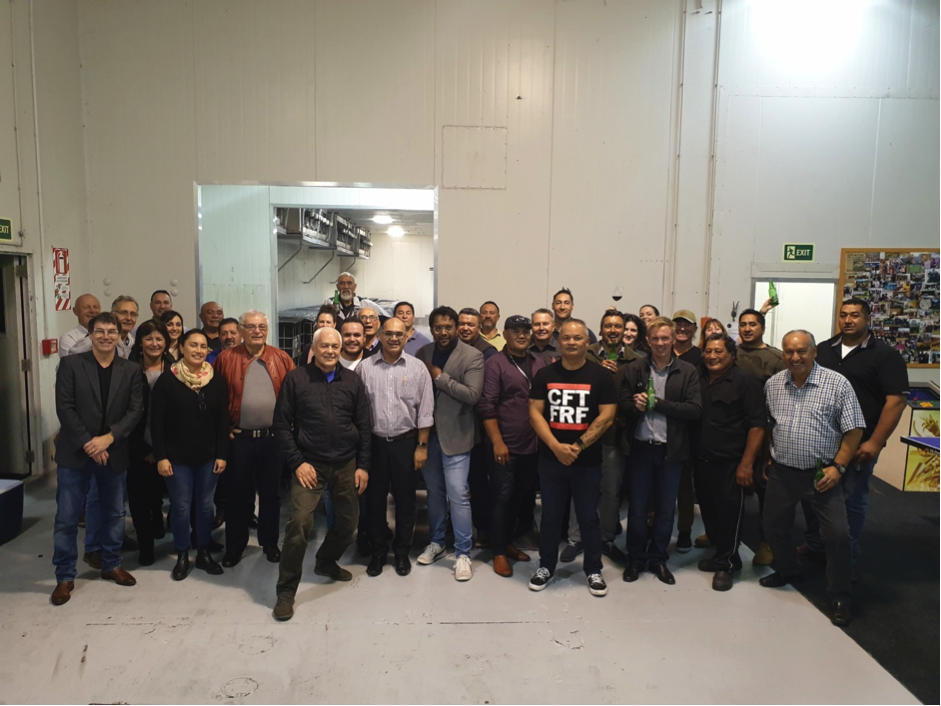
The MIHI whanau
Day two started with a sumptuous breakfast at Agrisea and then it was time to listen to a presentation from the Riddet Institute team. Here there was a dive into hemp product development possibilities with the Riddet’s food scientists Dr Anant Dave and Bhaskar Mitra. They talked about blending hemp with dairy producing a mix of plant and dairy proteins, creating hemp oil droplets for cosmetics and blending hemp with aquaculture as well as kiwifruit and other New Zealand grown foods. This was all about developing unique high value products that can leverage off the country’s reputation for producing safe and healthy food.
The Long Plain First Nation then beamed in from Manitoba, Canada where Josh Giesbrecht and Dr Brent Guppy talked about NPD activities in hemp and CBD. Long Plain grew 500 acres of hemp in 2018 and will take this up to 2500 acres in the coming years. Josh and Brent talked about the work they are doing with Brent in particular focusing on research into CBD for cancer sufferers. Regular discussions are being held with them on counter-seasonal supply, sourcing of cultivars and market opportunities in Nth America. All of this will lead to a collaborative agreement with MIHI.
Final speakers for the day were Bobby Leef and Ralf Schlothauer. Both are working with Josh and Brent on research into blending honey with CBD. So far this looks promising as well as being another product opportunity for MIHI.
The day two sessions were all about uncovering opportunities for MIHI to focus on. NZ is behind other parts of the world when it comes to hemp and CBD product and market development. We therefore have to develop points of differentiation and uniqueness and leverage off the NZ brand. To do this though will take time, we will need to partner with different experts and we’ll need to pool resources especially capital. But then this is what MIHI is about, this is why we have come together under the mantle of whanaungatanga-collaboration.
Given the humour and light-heartedness that permeated throughout the two day hui, it was only fitting that it ended with humour in the form of tautohetohe for where the next MIHI hui should be held. Two contenders lined up, one lot from Taitokerau in the form of the honey bros, Rob and Bobby and the other lot from Nga Rauru in the form of Mike Neho. After an impassioned kōrero from Rob in which you could see Mike wilting, Taitokerau or more precisely Ahipara will hold the 4th MIHI hui. This is likely to occur leading up to summer and will be interspersed with land yachting and horse rides along with the beach, fishing, surfing and paddle board excursions, and lots of honey tasting.

